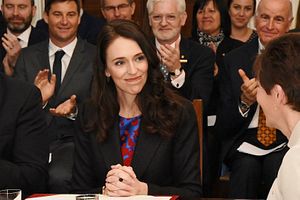The past week has seen New Zealand Prime Minister Jacinda Ardern on an official tour of the Polynesian region. Ardern has visited both Tonga and Samoa, as well as the self-governing nations in free association with New Zealand, Niue, and the Cook Islands. This was her first visit to the region since becoming prime minister in October last year.
The promoted reasoning for the visits has been to assess the damage and provide relief for the regions affected by last month’s Cyclone Gita. The cyclone hit Tonga especially hard and hundreds of homes and buildings were either destroyed or severely damaged, including the country’s parliament building. An initial aid package of $10 million has been provided by New Zealand to assist in the clean-up and rebuilding process.
Ardern’s delivery of disaster relief came also as the first steps in an attempt to re-engage New Zealand with its neighborhood. Like all states in the Indo-Pacific (and beyond), New Zealand is currently grappling with two grand strategic calculations: how to deal with the rise in power and influence of China, and concerns about the trajectory of its traditional ally, the United States. How these two potentially seismic shifts affect the Pacific will increasingly become a core concern for New Zealand.
New Zealand’s traditional engagement in the Pacific has operated in partnership with Australia under the umbrella of a U.S.-led regional order. As the region’s two largest economies, with the greatest regional capabilities, the pair have operated under this umbrella as mostly benevolent, albeit often paternalistic, actors without any real competition for influence from other states. This framework has now come under threat by China’s growing geopolitical reach.
This reality was acknowledged by New Zealand’s Foreign Minister Winston Peters in a speech to an Australian think tank last week. In his address, Peters directly tackled the issue of the country’s engagement in the region, and spoke of a “region challenged by a dizzying array of social and environmental problems and one attracting an increasing number of external actors and interests.” He added that it was “critical for New Zealand to embark on a new, re-energized Pacific strategy.”
Peters highlighted that it was not only a regional connection the country has with the Pacific, but an ethnic and cultural one as well. He noted that one in five New Zealanders have Maori (a Polynesian people) or Pasifika (Melanesian, Micronesian or Polynesian) heritage, and this was a growing demographic. In fact, Auckland is the largest Pasifika city, and could be considered a cultural hub for Pasifika people.
Yet this regional connection is deemed not enough to maintain New Zealand’s influence in the region. Peters highlighted that the Pacific Islands were no longer a space free of great power interest, and spoke of a “strategic anxiety” about countries with greater resources (without specifically naming China) contesting New Zealand and Australia for influence.
The reality of this new contested space was apparent as Prime Minister Ardern arrived in Tonga at the same time the country’s king and deputy prime minister were both in China, where they had announced a new “strategic partnership” with President Xi Jinping. The leaders signed seven new agreements concerned economic and technological assistance, as well and education initiatives. While these initiative could have a positive impact on Tonga’s development, the country remains in debt to China for tens of millions of dollars — significant sum for a small island state — and this has the potential to give Beijing leverage over the country.
As Australia recently and awkwardly demonstrated when criticizing Chinese aid in the Pacific, there is a pressing concern with the two traditional powers about what changes increased Chinese influence in the region may create. Yet current Pacific Island leaders are now more outwardly confident and less deferential to their larger neighbours, and see opportunities in partners beyond the region. They cannot be viewed by Wellington or Canberra as naïve for doing so.
While concern about Beijing’s strategic interests is valid, there are also concerns over whether Australia and New Zealand are themselves acting responsibly in the region. An analyst from Chatham House has questioned whether the PACER Plus regional free trade agreement being pushed by New Zealand and Australia will actually have any tangible economic benefits for the region, assist in regional connectivity and integration, and whether it might be a destabilizing force instead. Dispute over the agreement was a factor in the dismissal of the Tongan government last year, and Fiji and Papua New Guinea — the two largest Pasifika economies — have refused to sign on.
For New Zealand to truly “reset” its relationship in the Pacific and be a “good and active neighbor,” Peters outlined five guiding principle in his Sydney speech. These were: understanding, friendship, mutual benefit, collective ambition and sustainability. The final principle being a pressing and existential concern for Pacific Island states and one that both New Zealand and Australia need to take more seriously in order to gain greater respect in the region.
With Ardern surveying the damage to the region created by Cyclone Gita, a recognition of the increased frequency and the continue damage these weather events are causing should be a lesson taken from her regional tour. Making sure that New Zealand’s response is not simply one part of a “donor-recipient” relationship, and more of a consultative partnership will be the primary test of her government’s foreign policy.

































